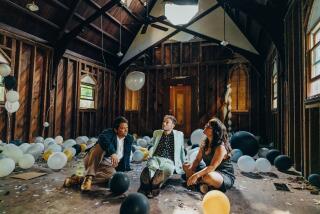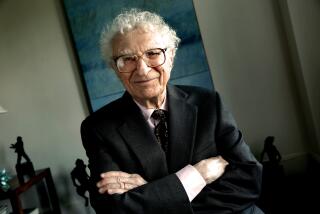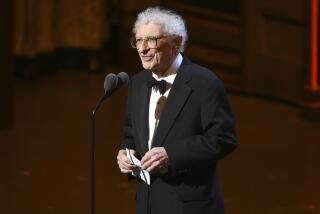POP MUSIC REVIEW : Harry Connick Jr. Has Changed His Tune : Young Vocalist Drops the Annoying, Superior Air of the Big-Band Purist and Adds to His Repertoire
- Share via
COSTA MESA — That was Harry Connick Jr. getting down off his high horse Wednesday night at the Pacific Amphitheatre.
We mean really getting down. Actually, too far down.
Two years ago at the Orange County Performing Arts Center, Connick had come off as a smug, elitist, annoyingly self-serving crusader for the Sinatra-style standards and big-band swing that it’s his mission to introduce to a younger, mainstream pop audience. Connick touted the virtues of his chosen style and his 17-man band so incessantly that one wondered whether he was practicing for a career in P.R. He opined that the big-band ‘40s were the golden age of popular music, and that the sounds of today are “blatant and classless.” Connick’s performance that night had its good points, but his lip made it hard for any rock fan to be wild about Harry.
Maybe an older (he’s all of 24 now) Connick, the son of a New Orleans politician, has wised up to the fact that campaigners who have a real program to sell don’t need to resort to Willie Horton attack-dog tactics in order to get out the vote. Or maybe it simply dawned on him that his elitism and stylistic redlining didn’t do honor to his hometown’s rich musical legacy. In New Orleans, a crucially fertile spawning ground for jazz and blues and R & B and rock ‘n’ roll, the tradition says that musicians should be elastic and open, not rigid and closed--which is why New Orleans has produced such style-hopping delights as the Neville Brothers, the Dirty Dozen Brass Band and Branford Marsalis.
Whatever the reason, Connick evidently has re-examined his purist instincts and stifled them. Opening the Pacific’s late-starting season in front of 10,000 or so fans (the turnout indicates he’s doing pretty well as a crusader for the standards), Connick went for a mix that found him swinging confidently through his big-band ouevre, but also wailing some gospel, bopping the blues, jumping into Mardi Gras parade-rhythm R & B out of the Professor Longhair songbook, and even paying homage to full-on James Brown funk. And Connick’s sensibility, if not his sound, was pure rock ‘n’ roll as he went for the big, flashy gesture as cannily and consistently as a Rod Stewart.
It made for an evening that was almost too much fun (and, at more than 2 1/2 hours, also too long). We got to see Connick tap-dancing, Connick kicking his leg like a Rockette, Connick slamming down the lid to his piano keyboard and banging out rhythms on it (and subsequently the rest of his Steinway) like a drummer gone amok. We got to sing along as Connick called for a boys-versus-girls volume contest on “You Are My Sunshine,” giving him something in common with your garden-variety rap act. For that matter, we got to hear a version of “You Are My Sunshine” that may have been the world’s funkiest (for a while there, Connick even sounded like Stevie Wonder in his chestier range), but surely was the world’s longest. It was one of several tunes that were delightful for a time, then began to wear thin with overextension as Connick called for solo after solo and band members joined him in all sorts of party-minded prankishness.
Instead of talking up his band, as he had two years ago, Connick just let it play. Trumpeter Leroy Jones was the most-featured soloist, and for good reason: each time Harry called on him, he came up with bright, enlivening sallies. Drummer Shannon Powell was another engaging player, driving the band with alertness and exuberance. Connick, who proved a gifted mimic, spent a good deal of time cutting up with the band, to the point where he wound up at one point draped against the drum riser, convulsed in laughter.
That shared sense of enjoyment and camaraderie is a charming quality that should never be discouraged. But on this night, Connick got so wrapped up in the extracurricular activities that he let it overshadow the music. He played just 17 songs, including only two from his most recent album, “Blue Light, Red Light.” The program’s carnival atmosphere didn’t allow for any of the album’s ballads, including the sad and lovely “Sonny Cried.” Connick did get to “He Is They Are,” which, despite some odd turns of phrase in the lyrics, accomplishes a rare feat with its wryness and warmth: appreciating one’s dad in song without getting drenched in syrup and cliche.
Connick did manage a number of the crisp, swinging standards and originals that are his stock in trade (for a long while during the middle of the show, as he moved from “You Are My Sunshine” done funky to “Sweet Georgia Brown” done barrelhouse to the Dixieland “Sheik of Araby” and the R & B Mardi Gras celebration, “If You Go to New Orleans,” one wondered whether he’d forgotten about that). During a show-opening sprint through Cole Porter’s “It’s Alright With Me,” Connick slammed and clanged out an aggressive, dissonant piano solo that seemed geared to answer critics’ complaints that his keyboard work is too safe and reserved. When he attempted Professor Longhair’s classic New Orleans R & B piano style on “Go to the Mardi Gras,” Connick, though no slouch, seemed out of his element. His cadences were rushed and nervous, rather than easy rolling and playfully relaxed. In Connick’s hands, this signature style of the Big Easy sounded too much like a Big Effort.
Connick the singer was appealing in all modes, but still lacked emotional clout. On the gospel song, “Just a Closer Walk With Thee,” Connick negotiated all the note-bending tropes and falsetto cries of good gospel singing, but failed to tap the potent spiritual issues below the surface. If Connick is to succeed in forging a lasting resurgence for the big-band sound, he’ll need to develop greater emotional reach, a quality that may ripen as he gets older and adds to his fund of experience. He’ll also have to write some new songs that have the stuff of those old standards he loves--that glow of specialness that will make other artists want to sing them, too. He has made progress in that direction with the memorable (but on this night, unplayed) ballads, “It’s Time” and “Sonny Cried.”
With his obvious talents as a handsome, crowd-pleasing showman, it’s likely that Connick will be around a long time, even if he never does add a chapter of his own to the Great American Songbook. His newfound musical ecumenism should make him a lot easier to take than his previous incarnation as a militant purist.
More to Read
The biggest entertainment stories
Get our big stories about Hollywood, film, television, music, arts, culture and more right in your inbox as soon as they publish.
You may occasionally receive promotional content from the Los Angeles Times.










